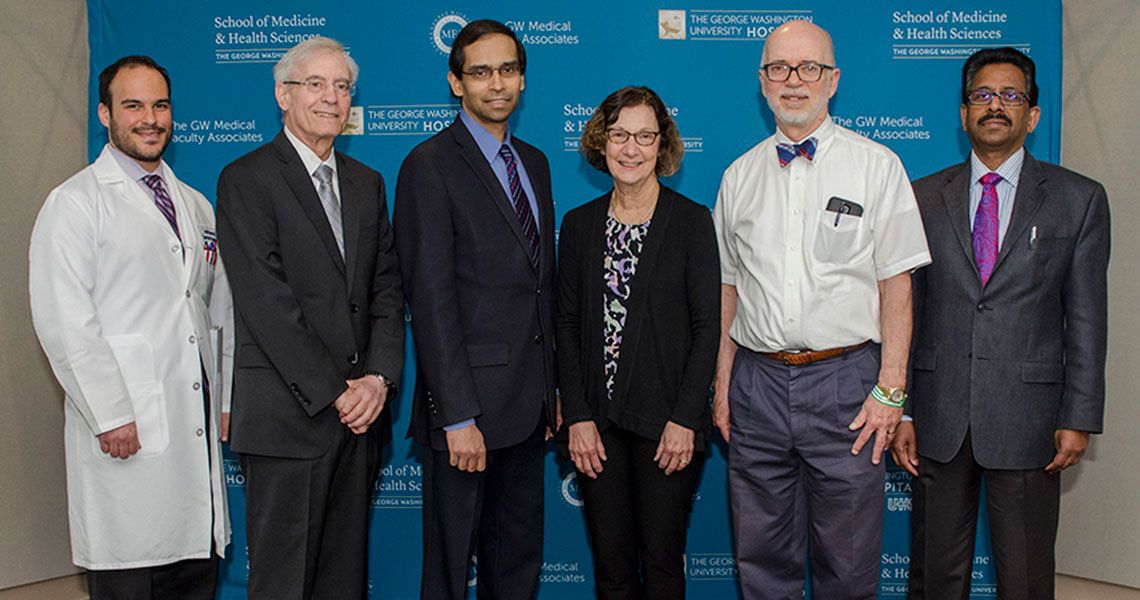The tale he’d been asked to tell, said Deepak L. Bhatt, M.D., M.P.H., executive director of interventional cardiovascular programs at the Heart and Vascular Center at Brigham and Women’s Hospital and professor of medicine at Harvard Medical School, was about Symplicity HTN-3, really “a story of hypertension and a novel renal artery ablation therapy for hypertension.”
Bhatt’s story — a request from Dominic Raj, M.D., director of the Division of Renal Diseases and Hypertension and professor of medicine at the George Washington University School of Medicine and Health Sciences (SMHS) — came at the Irene Tamagna Lecture on Hypertension in early May. Tamagna, now “102 years young,” according to Alan Wasserman, M.D., chair and professor in the Department of Medicine and Eugene Meyer Professor of Medicine at SMHS, has her own set of stories, many of which highlight her persistence and dedication to medicine. In one instance, Wasserman said, Tamagna, who focused on hypertension during her career, skied to a patient’s house after a blizzard to provide treatment.
“The stories on [Dr. Tamagna] I’ve heard from the faculty here really give me a sense of what a wonderful human being and physician that she is, really an inspiration to all of us,” Bhatt said before transitioning to his own talk, “Blood Pressure Control: Shouldn’t It Be Simple?”
With Symplicity HTN-3, Bhatt examined the utility of a novel intervention as a potential solution to managing resistant hypertension. As the population of patients has aged, cases of hypertension have subsequently increased; 10 percent of those cases are resistant hypertension. “The definition of resistant hypertension that I’m using for the purpose of this talk and in [the] trials I’ll review,” Bhatt said, “consists of patients who fail to achieve a goal blood pressure of less than 140/90 using three different drugs of pharmacologically complementary mechanisms, one of which is an appropriately dosed diuretic.” In other words, he explained, patients qualify as having resistant hypertension if they are taking at least three kinds of medication that do not control the disease.
What has emerged as a key target for treating resistant hypertension, Bhatt added, is the sympathetic nervous system, or SNS. “As it turns out, [it] appears to play an important role in resistant hypertension. A number of non-blinded studies have suggested a catheter-based renal artery denervation reduces blood pressure in resistant hypertension,” he said. “That led to a lot of excitement in the field.”
As Bhatt explained, the brain is central, where SNS traffic and renal afferent nerves flow, but it’s a two-way street; SNS traffic can move away from the brain, which can decrease renal blood flow and increase sodium retention, among other effects. “As it turns out,” he added, “these sympathetic nerves … cluster around the renal artery, primarily lying within the adventitia, hence the possibility to actually ablate them, heat them, destroy them, with catheters.”
The hypothesis, based on past surgical precedents of sympathectomy, is that by inserting a catheter into the renal arteries and ablating the sympathetic nerves, nephrologists can reduce blood pressure. Bhatt first looked at the efficacy of the catheter in Symplicity HTN-1, followed by a randomized trial in Symplicity HTN-2. Those studies, however, were conducted in Europe; to bring the catheter to the United States, he’d have to conduct a randomized trial stateside.
That double-blind trial used two different groups, one of which received a “sham procedure,” or placebo-like procedure, which Bhatt said was critical for its use as a control group. The other group received the ablation, or renal denervation, therapy, though patients from the first group could eventually transition to the second group to receive the treatment if they wanted. Bhatt and his fellow researchers went to extensive lengths to ensure that the patients were kept as blind as possible, including using sensory isolation — ear plugs and face masks — and ensured that at every step the medical procedures used were sound.
“We judged that the procedure was safe … but the real question was, ‘is it efficacious?’” Bhatt asked. The results of the study, it turned out, were somewhat surprising: there was no real difference in effect between the renal denervation procedure and the sham procedure.
In the time since the study, Bhatt has noted that there was “pretty strong evidence” that patients experienced a reduction in blood pressure past the 6-month endpoint of the trial, and he acknowledged possible limitations, including patients’ adherence to medication, changes in medication, the endpoint as potentially too short, and the interventionists’ learning curve for the procedure.
He’s now “back to the drawing board,” he said, focusing on renal denervation data and possible technological solutions, including a spiral catheter. Meanwhile, he concluded, he’s looking at “lessons learned,” such as catheter design, trial design, placebo effect, and heterogeneity of operator skills, while keeping an eye on the innovative approaches to hypertension reduction other researchers are using.
“The lessons that we learn from renal denervation, I think, hopefully, will apply as we study multiple other therapies,” Bhatt said. “As [we continue] the development of various procedural and device-based approaches to treating hypertension, some of the lessons that we learn can inform those and allow trials to be conducted in ways that are scientifically rigorous, ethical, and will help patients.”



